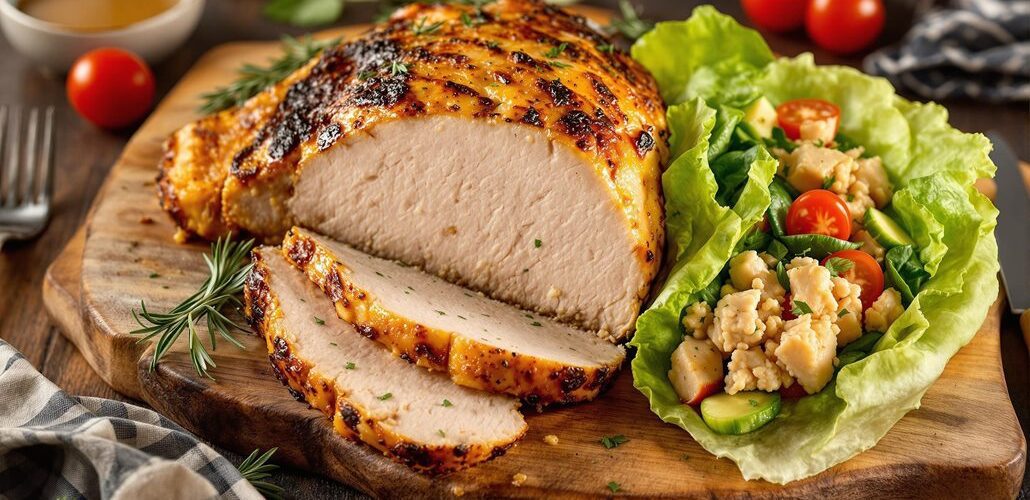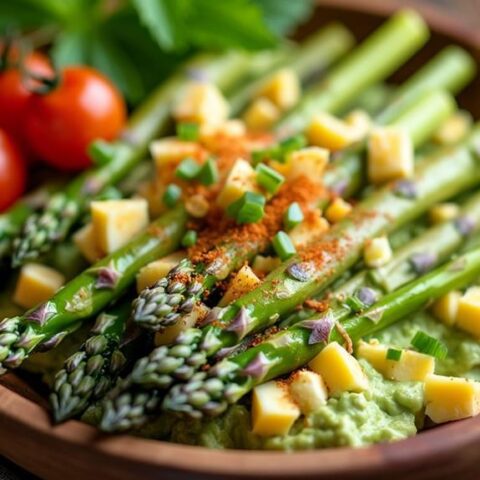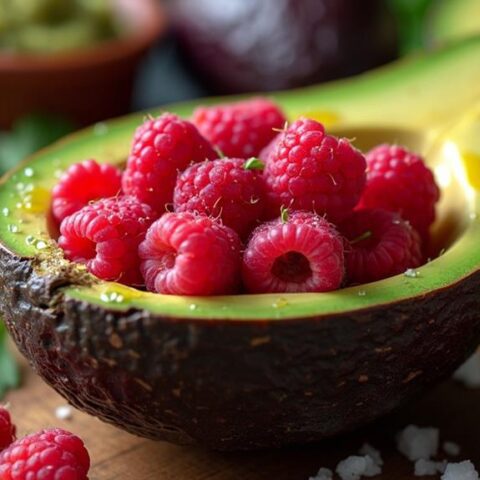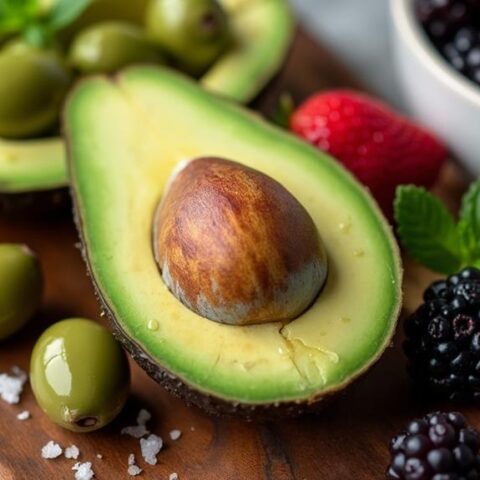
Turkey is keto-friendly primarily due to its minimal carbohydrate content, with only 0.14 grams of net carbs per 100 grams, which supports ketosis by maintaining low glycogenic impact. Its high protein content, providing 23.66 grams per 100 grams, promotes satiety and aids in muscle maintenance. While turkey is naturally low in fat, this allows for flexibility in adding healthy fats to tailor the macronutrient balance essential for the ketogenic diet. Rich in essential B vitamins and minerals, turkey also supports stable energy levels and blood sugar management, enhancing its value in keto meal planning. Discover its versatile applications.
Key Takeaways
- Turkey contains only 0.14 grams of net carbs per 100 grams, ideal for low-carb ketogenic diets.
- It offers 23.66 grams of protein per 100 grams, promoting satiety and muscle growth.
- Low-fat content allows flexibility in adding healthy fats for keto macronutrient balance.
- Rich in B vitamins and minerals, turkey supports energy metabolism and overall health.
- Versatile cooking options make turkey adaptable for various keto-friendly meals.
Turkey's Carb Content
Turkey stands out as an exceptionally low-carbohydrate protein choice, containing only 0.14 grams of net carbs per 100 grams serving. This negligible carb content makes turkey an ideal component of a ketogenic diet, which emphasizes high-fat, moderate-protein, and low-carb intake to promote ketosis.
In ketosis, the body shifts from using glucose to fat as its primary energy source, which considerably reduces blood glucose levels and aids in managing type 2 diabetes. Turkey's minimal contribution to total carbohydrate intake facilitates this metabolic change, supporting ketosis by ensuring that daily carb consumption remains within the recommended 20-50 grams of net carbs.
The glycemic index of turkey is 0, indicating it has virtually no impact on blood sugar levels, an essential factor for maintaining the steady state of ketosis. By providing high-quality protein without notable carbs, turkey aligns with ketogenic dietary principles, helping individuals adhere to their nutritional goals without compromising taste or variety.
Additionally, turkey's role in a ketogenic diet is not merely about its low carb content; it also supports muscle maintenance and growth through its rich protein profile. Therefore, incorporating turkey into a ketogenic regimen allows for a balanced, effective approach to low-carb eating without the risk of derailing ketosis.
Nutritional Advantages
Turkey offers significant nutritional advantages for individuals following a ketogenic diet, primarily due to its high protein content and minimal carbohydrate presence.
Particularly, ground turkey provides 23.3g of protein per serving without any carbs, making it ideal for various keto-friendly dishes and snacks. With only 0.14 g of net carbs and 23.66 g of protein per 100 g, it supports muscle growth while maintaining ketosis.
Additionally, turkey is an excellent source of essential vitamins like B-6 and B-12, contributing to energy metabolism and overall health, with its low glycemic index ensuring stable blood sugar levels.
Rich Protein Source
While considering protein sources that align with a ketogenic diet, turkey emerges as an exemplary choice due to its notable nutritional profile. The rich protein content of turkey, offering an impressive 23.66 g per 100 g serving, makes it an ideal source for those adhering to a keto or low-carb diet.
Protein is fundamental in muscle building and repair, which is critical for maintaining lean body mass. In addition, turkey's low-fat content, at only 1.48 g per 100 g, complements the keto emphasis on high protein intake while ensuring that fat consumption remains controlled.
The nutritional advantages of turkey extend beyond its macronutrient composition:
- Essential vitamins: Rich in B-6 and B-12, turkey supports energy metabolism and overall health.
- Satiety: High protein levels promote satiety, potentially reducing overall food intake and aiding in weight management.
- Glycemic index: With a glycemic index of 0, turkey does not impact blood sugar levels, supporting stable energy.
- Weight management: Its satiating properties can assist in managing weight effectively on a low-carb diet.
Low Carbohydrate Content
Complementing its role as a robust source of protein, the low carbohydrate content of turkey further enhances its suitability for a ketogenic diet. With a mere 0.14 grams of net carbs per 100 grams, turkey stands out as an ideal meat option for individuals seeking to maintain ketosis. This low net carb profile is vital for the keto diet, which relies on minimizing carbohydrate intake to facilitate fat burning as the primary source of energy.
Moreover, turkey's negligible glycemic index of 0 ensures it exerts minimal impact on blood sugar levels, making it particularly beneficial for individuals managing diabetes alongside their keto regimen. By not causing spikes in glucose levels, turkey helps maintain metabolic stability, a key factor in sustaining ketosis.
Furthermore, the interplay between turkey's macronutrient composition allows for strategic dietary planning. While providing 23.66 grams of high-quality protein per 100 grams, turkey's low-fat content of 1.48 grams per 100 grams permits the addition of healthy fats from other sources, essential for the keto diet's balance.
This combination supports muscle maintenance and growth without compromising carbohydrate restrictions, thereby solidifying turkey's role in a nutritionally advantageous ketogenic eating plan.
Essential Vitamins and Minerals
How does turkey contribute to the nutritional demands of a ketogenic diet beyond its macronutrient profile? This lean protein source is not only low in carbohydrates but also rich in essential vitamins and minerals, making it an ideal component of a keto-friendly meal plan.
Turkey provides a thorough array of nutrients that support various physiological functions, critical for individuals adhering to a ketogenic lifestyle.
- Essential Vitamins: Turkey is abundant in B vitamins, specifically B-6 and B-12, which are fundamental for energy metabolism and brain health. These vitamins are particularly important in a ketogenic diet, where energy requirements are primarily met through healthy fat and protein intake.
- Minerals: Turkey is a good source of iron, necessary for oxygen transport in the bloodstream, and potassium, which aids in fluid balance and muscle function. These minerals play a significant role in maintaining overall health and physical performance on a keto diet.
- Protein: With 23.66 g of protein per 100 g serving, turkey offers high-quality protein essential for muscle building and repair, supporting the increased protein demands of a ketogenic diet.
- Low in Unhealthy Fats: Turkey is low in saturated and trans fats, promoting heart health, a priority for a balanced keto meal plan.
Impact on Blood Sugar
Turkey, with its glycemic index of 0, is an exemplary food choice for those managing blood sugar levels, particularly on a ketogenic diet. This is primarily due to its negligible impact on blood sugar, as it contains only 0.14 grams of net carbs per 100-gram serving. The low carbohydrate content in turkey prevents significant spikes in insulin, a vital factor for individuals with diabetes or those working to maintain ketosis.
By contributing minimally to daily carbohydrate intake, turkey aligns with the keto diet's objective of limiting carb consumption, thereby supporting stable glucose levels. Additionally, improved insulin sensitivity is a key benefit of the ketogenic diet, which turkey complements by maintaining low blood sugar levels without causing harmful spikes.
The consumption of turkey not only aids in blood sugar regulation but also enhances satiety, playing an essential role in hunger control and reducing cravings. This satiety factor assists in maintaining consistent energy levels without the fluctuations typically associated with high-glycemic foods.
Protein and Fat Balance
Achieving the ideal macronutrient ratio is vital for individuals adhering to a ketogenic diet, where turkey's high protein and low-fat profile necessitates the addition of healthy fats to maintain ketosis.
To effectively regulate appetite, adding fats such as olive oil or butter can help stabilize insulin levels and prolong feelings of fullness.
By incorporating these fats, not only can the dietary balance be maximized, but the flavor of meals can also be enhanced, making them more palatable and satisfying.
This strategic approach guarantees that individuals can harness turkey's muscle-building benefits while adhering to the high-fat requirements essential for a successful keto regimen.
Optimal Macronutrient Ratio
Balancing protein and fat intake is essential for optimizing the macronutrient ratio in a ketogenic diet, and turkey serves as an excellent foundation due to its high protein and low-fat profile.
With 23.66 g of protein and only 1.48 g of fat per 100 g serving, turkey provides a substantial amount of protein while keeping fat levels minimal. This composition is beneficial for those looking to maintain muscle mass and enhance muscle repair on a ketogenic plan.
However, the low-fat content necessitates pairing turkey with healthy fats to meet the dietary fat requirements vital for ketosis.
Key benefits of incorporating turkey into a keto diet include:
- Protein-Rich: Supports muscle building and repair, vital for maintaining lean body mass.
- Low-Fat: Allows for flexibility in adjusting fat intake with additional healthy fats like olive oil or butter.
- Macronutrient Balance: Facilitates achieving the high-protein, sufficient-fat ratio needed for effective ketosis.
- Versatile: Offers adaptability in meal planning to meet individual macronutrient goals.
Enhancing Meal Flavor
To maximize the benefits of turkey in a ketogenic diet, enhancing meal flavor becomes an important consideration, particularly when aiming for a balanced protein and fat intake.
Turkey, renowned for its high-quality protein content—23.66 grams per 100 grams—supports muscle building and repair while ensuring satiety. However, its low fat content (1.48 grams per 100 grams) necessitates the integration of healthy fats to maintain the desired macronutrient ratio vital for keto.
Olive oil emerges as an exemplary addition, offering monounsaturated fats that complement turkey's lean profile, fostering a synergistic balance between protein and fat.
Incorporating spices and herbs is instrumental in augmenting the flavor of turkey without introducing additional carbohydrates. Spices not only enhance taste but also allow for a varied culinary experience, significant for adherence to a ketogenic lifestyle.
Turkey's adaptability—whether roasted, grilled, or integrated into salads—ensures diverse meal preparations that align with keto's low-carb mandate, with typical servings containing approximately 2 net carbs per 3-ounce portion.
Versatile Cooking Options
Turkey emerges as a versatile protein choice in keto-friendly cooking, offering a plethora of preparation methods that align with ketogenic dietary principles. As a low-carb protein, turkey can be seamlessly integrated into various dishes, making it an ideal option for those adhering to a keto regimen.
Not only does turkey provide lean protein, but it also plays a role in improving metabolic health by supporting a diet low in carbohydrates and high in nutrients. The adaptability of turkey is evident in the diverse cooking techniques available, which cater to different tastes and dietary needs.
- Roasting: This method brings out rich flavors while maintaining the meat's natural nutrients, making it a staple in keto meal planning.
- Grilling: Ideal for outdoor cooking, grilling adds a smoky flavor to turkey, enhancing its appeal as a low-carb, high-protein ingredient.
- Sautéing: Quick and efficient, sautéing preserves turkey's tenderness and allows for easy pairing with keto-friendly vegetables.
- Ground Turkey: Perfect for creating low-carb burgers or meatballs, ground turkey offers a flavorful alternative to traditional high-carb options.
The inclusion of turkey in salads provides a lean protein source that complements low-carb vegetables and dressings.
Additionally, turkey can be creatively utilized in breakfast dishes like omelets, ensuring a satisfying start to the day while maintaining a low-carb intake.
Turkey in Keto Recipes
Building on the diverse cooking methods highlighted earlier, incorporating turkey into keto recipes offers a strategic avenue for maintaining a low-carb diet while enhancing culinary variety. Turkey's minimal carb content, at only 0.14 g net carbs per 100 g, makes it an ideal protein source for keto enthusiasts aiming to limit their carbs per day. Its high protein content (23.66 g per 100 g) not only aids in muscle maintenance but also promotes satiety, essential for adherence to ketogenic principles.
| Turkey Dish | Carbs per Serving | Healthy Fats Added |
|---|---|---|
| Grilled Turkey Salad | 1 g | Avocado slices |
| Turkey Stuffed Peppers | 3 g | Olive oil drizzle |
| Turkey Burgers | 2 g | Cheese topping |
| Turkey Stir Fry | 2 g | Coconut oil |
Incorporating turkey into dishes like stuffed peppers or burgers allows for customization with low-carb vegetables and healthy fats, enhancing both flavor and nutritional content. Additionally, turkey's low-fat profile can be effectively balanced with high-quality healthy fats, such as avocado or olive oil, to optimize energy levels and facilitate weight loss. This strategic use of turkey in meal prep aligns with keto dietary goals, ensuring a sustainable balance of macronutrients while maintaining culinary flexibility.
Frequently Asked Questions
Is Turkey Ok on a Keto Diet?
Turkey is an ideal choice for a keto meal due to its low carbohydrate content and zero glycemic impact. As a protein source, turkey nutrition supports muscle maintenance, offering 23.66 g of protein per 100 g serving.
What Meat Is Best for Ketosis?
For ideal ketosis, prioritizing lean protein sources like turkey is advisable due to its low carb content. Incorporating turkey recipes can enhance dietary variety, while exploring meat alternatives such as chicken and fatty fish supports metabolic efficiency.
Why Does Turkey Have Carbs?
Turkey's carb content is minimal due to its nutritional composition, primarily protein and fat. Cooking methods typically do not introduce carbohydrates, ensuring turkey remains a low-carb option. Any trace carbs originate from negligible natural sources within the meat.
Why Is Turkey Healthier Than Bacon?
Turkey benefits from lower fat and higher protein content compared to bacon, according to nutritional comparison. Bacon drawbacks include higher saturated fats and fewer essential nutrients, making turkey a healthier choice for muscle maintenance and heart health.
Conclusion
Turkey is an ideal choice for ketogenic diets due to its low carbohydrate content, favorable macronutrient profile, and minimal impact on blood sugar levels. Rich in protein and essential fats, turkey supports muscle maintenance and satiety, aligning with keto dietary requirements. Its versatility in culinary applications enhances dietary adherence by allowing diverse meal options. Incorporating turkey into keto recipes can effectively contribute to achieving dietary goals, making it a practical and nutritionally advantageous component of a ketogenic regimen.










No Comments